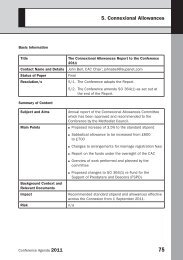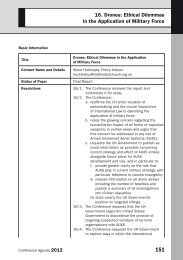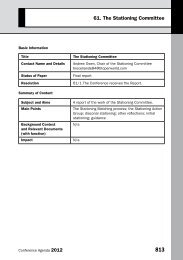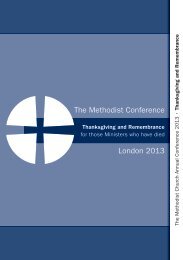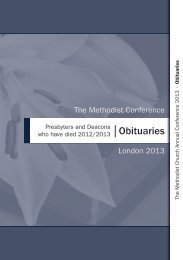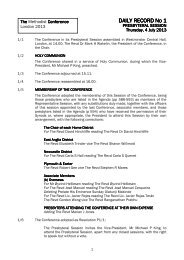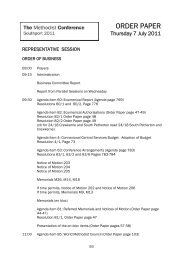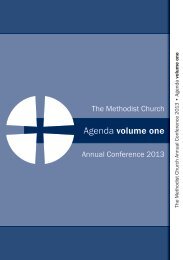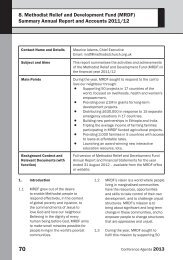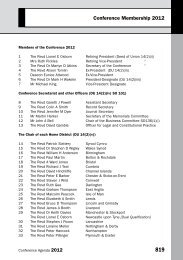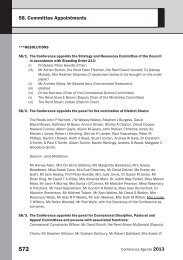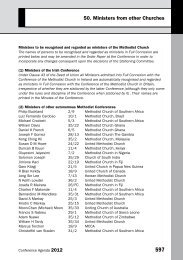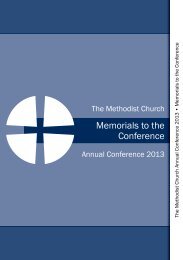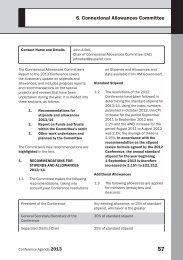Agenda Volume 3 - Methodist Conference
Agenda Volume 3 - Methodist Conference
Agenda Volume 3 - Methodist Conference
You also want an ePaper? Increase the reach of your titles
YUMPU automatically turns print PDFs into web optimized ePapers that Google loves.
57. The Fruitful Field Project<br />
balancing the need to give clarity<br />
and direction to formation and<br />
training in the Church of England<br />
with the need to create and preserve<br />
space for growing ecumenical<br />
participation in the new awards at<br />
both national and local level, as<br />
seems most appropriate to our<br />
partners.” 23 As well as inviting the<br />
<strong>Methodist</strong> Church’s involvement,<br />
the Church of England is also<br />
working with the United Reformed<br />
Church and colleges aligned with<br />
the Baptist Union of Great Britain.<br />
The Committee is grateful to the<br />
Church of England for its willingness<br />
to work in this ecumenical manner,<br />
and the Committee has sought to<br />
accompany and feed into the Church<br />
of England’s processes at every<br />
stage. Over recent months, this has<br />
become a more formal partnership,<br />
with full <strong>Methodist</strong> representation on<br />
the working party which is developing<br />
the detail of the suite of awards and<br />
<strong>Methodist</strong> staff support incorporated<br />
into the processes for identifying a<br />
university partner. It is expected that<br />
the university partner will be identified<br />
in late May or early June 2012.<br />
154 The Committee is committed to<br />
the development of pathways,<br />
opportunities, programmes and<br />
resources alongside and in<br />
partnership with ecumenical partners<br />
wherever possible, and sees this<br />
as a central value of the Network<br />
(see paragraph 127.5 above). The<br />
Committee consequently anticipates<br />
that the university partner identified<br />
through the processes discussed<br />
above will be a university which<br />
could also, within an ecumenically<br />
negotiated validating partnership<br />
with the university, serve a significant<br />
portion of the validating needs of the<br />
Network. It would, in many ways, be<br />
a backward step if <strong>Methodist</strong> student<br />
ministers and Anglican ordinands<br />
were not to be able to follow<br />
pathways within the same suite of<br />
awards. There are also many positive,<br />
developmental aspects to <strong>Methodist</strong><br />
participation. Not least among these<br />
is that participation within the same<br />
Higher Education partnership as the<br />
Church of England (and, potentially,<br />
the United Reformed Church and the<br />
Baptist Union of Great Britain) will<br />
make ecumenical collaboration in<br />
the development of future pathways<br />
and resources much easier – both<br />
for ordained ministry, and also for<br />
a wider range of ministries and for<br />
discipleship development more<br />
generally. The Committee is therefore<br />
very pleased that it seems likely, at<br />
the time of writing, that it will be able<br />
to recommend that the Network enter<br />
into the partnership which emerges<br />
from the current processes. The<br />
Priorities of the <strong>Methodist</strong> Church<br />
commit us to working “in partnership<br />
with others wherever possible,” and<br />
the Network’s participation within<br />
an ecumenical Higher Education<br />
partnership is a good instance<br />
of strong and mutually-beneficial<br />
partnership working.<br />
23<br />
“Formation for Ministry: Phase 2 Report”, 45<br />
<strong>Conference</strong> <strong>Agenda</strong> 2012 705



